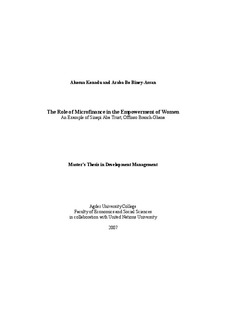The Role of Microfinance in the Empowerment of Women - An Example of Sinapi Aba Trust, Offinso Branch-Ghana
Master thesis
Permanent lenke
http://hdl.handle.net/11250/135127Utgivelsesdato
2007Metadata
Vis full innførselSamlinger
Sammendrag
Disempowerment among women due to certain cultural practices has been one of the
main barriers to development in developing countries. It is a problem that developing
countries governments cannot solve alone because of its financial implications. This
as a matter of fact has necessitated the private sector or non governmental
organizations to intervene in solving this problem. One of the means found to be
effective is the use of microfinance and it is believed that with microfinance women
can achieve some level of empowerment in their lives.
The study aims at finding out whether there is a possible causal relationship between
elements of SAT and the empowerment of women. SAT is chosen because it is a non
governmental organization in Ghana that deals in microfinance in all the ten regions
of Ghana. The Offinso branch is also selected because it has clients who are two years
and above.
Focus group discussions and an interview with women beneficiaries and loan officers
of the Branch was carried out to find out whether there is really a possible correlation
between access to microfinance and the empowerment of women. First of all, a brief
introduction to the study is given, the general concept about microfinance and the
conceptual framework to be used is narrated.
In the findings and analysis it was realized that access to microfinance has effect on
the individual, household/family, community and enterprise levels of beneficiaries. In
that some were able to increase their savings level, diversify their business, and
improve upon the living standards of their household.
Notwithstanding these, the women complained about the group loans which seem to
be the main product that the branch gives to them. It was therefore concluded that
effort should be made to give the women more individual loans and faction out
specific products that will meet/address the specific needs of these women.
Beskrivelse
Master's Thesis in Development Management - Agder University College, 2007
Utgiver
Høgskolen i AgderAgder University College
